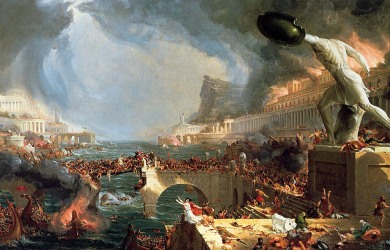| | 09 December, 2012
| | What’s the connection between climate change and the collapse of cultures? | | Topic being analyzed this week at the Hebrew University |
 | | What’s the connection between climate change and the collapse of cultures? |
|
A unique interdisciplinary conference analyzing how climate change has led to the rise and fall of cultures over the centuries opened today at the Hebrew University of Jerusalem and will continue throughout the week. The event is a first joint effort by the Institute of Advanced Studies at the Hebrew University and the university’s Scholion Interdisciplinary Research Center in Jewish Studies.
Billed as a Winter Academy, it is entitled “Analyzing Collapse: Destruction, Abandonment and Memory” and is being held at the Institute of Advanced Studies in the Feldman Building on the Edmond J. Safra Campus of the university.
All sessions are in English and feature lectures by scholars from a variety of fields, including archaeology, geography, climatology, anthropology, history and classical studies. Lecturers are from the Hebrew University, other Israeli universities, and from the US and Europe.
The sessions are open to the public at no cost. In addition there will be field trips to areas of collapse in Israel, such as Beit She’an, Hazor and Jerusalem, for which there is additional cost.
Various historical examples of cultures and regimes that were affected by climate change will be presented by the lecturers, including events in China of some 4,000 years ago, the Roman Empire and Baghdad under Mongolian rule.
“We will be trying to examine the reasons that led to the sudden collapse of cultures,” said Prof. Ronnie Ellenblum of the Department of Geography at the Hebrew University, one of the organizers of the academy. “Some of the academy participants argue that climate change was a decisive factor, while others say that climate was only one of a worldwide dynamic leading to change.”
Climate change affects food production and its costs, continued Ellenblum. When food prices rise, it brings about unrest among the citizens, who protest against their rulers. If those in power fail to find a solution, they may be toppled. “There are those who feel this is a process that occurs even today,” said Ellenblum.
|
|


